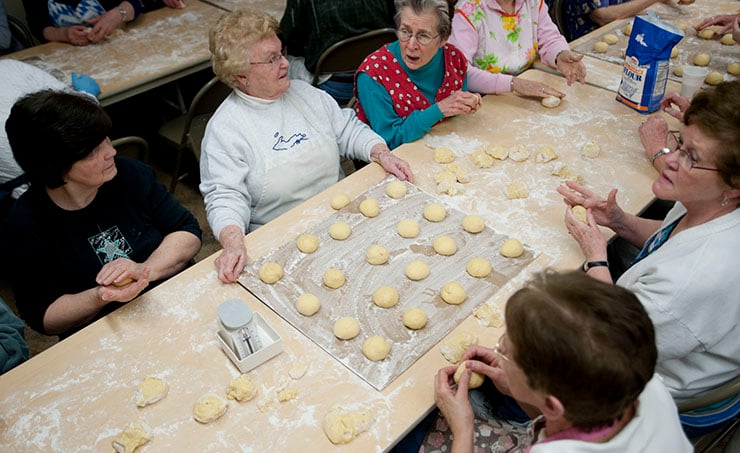Every Sunday after morning mass at the St. Joseph’s Church in Ronkonkoma, New York, parishioners host events to engage the local community. These kinds of social gatherings are readily promoted throughout the year, even by secular institutions. Intelligent community leaders look to steer Americans back to their roots—where “neighbor” was not simply a term for an adjacent dweller.
Today, “neighbor” and “friend” are rarely used interchangeably as community engagement in the United States continues to decline as it has for the better part of the last three decades.
Electronics and their “social” media platforms have become an artifice of community, replacing for many what was once a great part of traditional America. But technology is far from the only reason we are here today, existing in an increasingly valueless society, notably adjoining ourselves to the growth of secularism.
Harvard University political scientist Robert D. Putnam wrote at length about the issue in his 2000 book Bowling Alone: The Collapse and Revival of American Community.
To him, value lies within “social capital”—what he defined as “the connections among individuals’ social network and the norms of reciprocity and trustworthiness that arise from them.” Community builds social bonds, allowing for support, camaraderie, and a sense of belonging. According to Putnam, social capital is demonstrated through two types of networks: “bonding” and “bridging.”
The bonding networks mobilize solidarity and reciprocity as a means of “getting by,” while bridging networks drive the purpose of “getting ahead.” Putnam referred to bonding social capital as a “sociological superglue, whereas bridging social capital provides a sociological WD-40.”
One is meant for social cohesion, while the other is for progress, or greasing the gears to accomplish tasks.
Essentially, if this view of community were in practice today, we could sidestep the prevalent censorship in digital discourse for an authentic exchange of different viewpoints. Individuals would be permitted to voice their opinions, granting a higher level of communication in which all in the community might be immersed. This exchange would subvert the fear tactics of corporate media and NGOs, and permit open expression and consideration of less prevalent opinions.
Today, the lines of communication are algorithmically regulated by nonprofits such as the Anti-Defamation League (ADL). True community—the basis of American society—does not permit such tactics of fear. True community allows dissidents a seat at the table without ostracization.
It is only when an individual clashes with social cohesion or progress that he or she is removed from true community. That is not today’s practice, as much of the removal, now called “canceling,” is simply politically motivated and although it is typically attributed to safety reasons. There are just too many examples to list, but more recently, a Newsweek editorial railed against the debanking of conservatives by JPMorgan Chase.
People who are in true community are always safer, more productive, and less oppositional—which would defeat the alleged purposes of today’s cancel culture, although the existence of such a community would likely expose cancel cultures more sinister and true objects. The mutual connectivity among members of community can even improve democratic institutions, said Putnam. Standards in morality would be democratic in nature and advanced by the populace—within the community, not by some outside force with an agenda.
On another note, there is a profound connection to the psychological and biological, as real human contact is required for good health. The “belonging hypothesis” is but one of many theories that stresses the basic need for community if we are to find meaning and positive human motivations.
Almost every year, we find ourselves as a nation wondering what is causing the rise in mental illness. Deflections to the COVID-19 pandemic tend to be typical, but a deeper look shows an innate connection to the missing social capital created through community.
Social capital had been increasing in the U.S. up until the 1970s. Notably, those born before 1930, who went through the Great Depression and the two World Wars, were more civic-minded, making them more engaged in community.
The 1970s, marked by the Vietnam War, the Watergate Scandal, and the rise in popular culture and mainstreaming of television, saw political participation decrease, as well as a decline in civic and religious participation.
Besides the aforementioned causes, Putnam understandably includes the pressures of time and money but leaves 15 percent of his final conclusion to the unknown.
In 2020, he wrote The Upswing: How America Came Together a Century Ago and How We Can Do It Again. There Putnam argues that religion can heal the division in the U.S., suggesting that religion may possibly account for the 15 percent of the cause of our current malaise unaccounted for in his previous book.
“America today is very polarized, unequal, socially isolated and narcissistic or self-referential,” Putnam told Religion News Service. “… Religious narratives and religious symbols have a huge power to move lots of people.”
He stressed to the outlet the “very cynical” youth who focus supremely on remedying the past: “We’re not condemned by history. History sets the problems we have to face, but history doesn’t set the solutions.”
Americans need to recognize that we are not bound by a narrative of the past preached by their Marxist college professors or the fear induced by corporate media and compounding NGOs. This country has never been plagued by so many social ills that are almost certainly of our own making and can be attributed to our lack of community. A civil reconciliation must be made for the sake of this country’s future. Communal Americanism needs to make a return for the nation to survive. There is no other remedy. With the 2024 presidential election on the way and the surging pressures from the conflict in Israel, Putnam’s message couldn’t be more prescient.



Leave a Reply